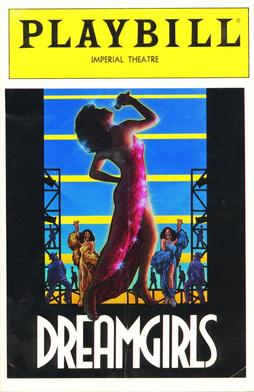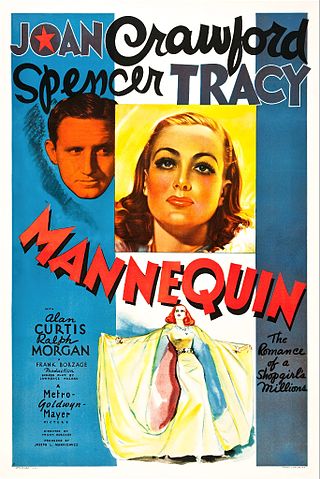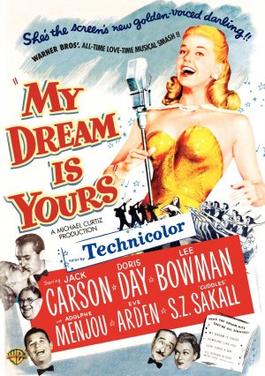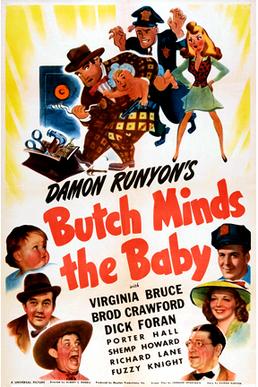
The Hollywood Revue of 1929, or simply The Hollywood Revue, is a 1929 American pre-Code musical comedy film released by Metro-Goldwyn-Mayer. It was the studio's second feature-length musical, and one of their earliest sound films. Produced by Harry Rapf and Irving Thalberg and directed by Charles Reisner, it features nearly all of MGM's stars in a two-hour revue that includes three segments in Technicolor. The masters of ceremonies are Conrad Nagel and Jack Benny.

William Broderick Crawford was an American stage, film, radio, and television actor, often cast in tough-guy roles and best known for his Oscar- and Golden Globe-winning portrayal of Willie Stark in All the King's Men (1949) and for his starring role as Dan Mathews in the television series Highway Patrol (1955–1959). Until filming All the King's Men, Crawford's career had been largely limited to "B films" in supporting or character roles.

Harry Warren was an American composer and the first major American songwriter to write primarily for film. He was nominated for the Academy Award for Best Original Song eleven times and won three Oscars for composing "Lullaby of Broadway", "You'll Never Know" and "On the Atchison, Topeka and the Santa Fe". He wrote the music for the first blockbuster film musical, 42nd Street, choreographed by Busby Berkeley, with whom he would collaborate on many musical films.

James Francis McHugh was an American composer. One of the most prolific songwriters from the 1920s to the 1950s, he is credited with over 500 songs. His songs were recorded by many artists, including Chet Baker, June Christy, Bing Crosby, Deanna Durbin, Ella Fitzgerald, Judy Garland, Adelaide Hall, Billie Holiday, Beverly Kenney, Bill Kenny, Peggy Lee, Carmen Miranda, Nina Simone, Frank Sinatra, and Dinah Washington.

Patrick Ray Leonard is an American songwriter, keyboardist, film composer, and music producer, best known for his longtime collaboration with Madonna. His work with Madonna includes her albums True Blue (1986), Who's That Girl (1987), Like a Prayer (1989), I'm Breathless (1990) and Ray of Light (1998). He scored Madonna's 2008 documentary I Am Because We Are, played keyboards with her at Live Aid (1985), and was musical director and keyboardist on The Virgin Tour (1985) and the Who's That Girl World Tour (1987).

Dreamgirls is a Broadway musical, with music by Henry Krieger and lyrics and book by Tom Eyen. Based on the show business aspirations and successes of R&B acts such as The Shirelles, James Brown, Jackie Wilson, and others, but closely follows the story of The Supremes as the musical follows the story of a young Black female singing trio from Chicago, Illinois called "The Dreams", who become music superstars.

International House is a 1933 American pre-Code comedy film starring Peggy Hopkins Joyce and W. C. Fields, directed by A. Edward Sutherland and released by Paramount Pictures. The tagline of the film was "The Grand Hotel of comedy". It is a mixture of comedy and musical acts tied together by a slim plot line, in the style of the Big Broadcast pictures that were also released by Paramount during the 1930s. In addition to some typical comedic lunacy from W. C. Fields and Burns and Allen, it provides a snapshot of some popular stage and radio acts of the era. The film includes some risqué pre-Code humor. The cast also features Cab Calloway with his orchestra and Bela Lugosi.

All the King's Men is a 1949 American drama written, produced, and directed by Robert Rossen. It is based on the 1946 Robert Penn Warren novel of the same name. The film stars Broderick Crawford, John Ireland, Mercedes McCambridge, and Joanne Dru. The plot focuses on the rise and fall of the ambitious and ruthless politician Willie Stark (Crawford) in the American South. Though a fictional character, Stark strongly resembles Louisiana governor Huey Long.

Stage Door Canteen is a 1943 American World War II film with musical numbers and other entertainment interspersed with dramatic scenes by a largely unknown cast. The film was produced by Sol Lesser's Principal Artists Productions and directed by Frank Borzage. The film features many celebrity cameo appearances but primarily relates a simple drama set in the famed New York City restaurant and nightclub for American and Allied servicemen. Six bands are featured. The score and the original song, "We Mustn't Say Goodbye", were nominated for Academy Awards.

"I Can't Give You Anything but Love, Baby" is an American popular song and jazz standard by Jimmy McHugh (music) and Dorothy Fields (lyrics). The song was introduced by Adelaide Hall at Les Ambassadeurs Club in New York in January 1928 in Lew Leslie's Blackbird Revue, which opened on Broadway later that year as the highly successful Blackbirds of 1928, wherein it was performed by Adelaide Hall, Aida Ward, and Willard McLean.

Babes in Arms is the 1939 American film version of the 1937 coming-of-age Broadway musical of the same title. Directed by Busby Berkeley, it stars Mickey Rooney and Judy Garland, and features Charles Winninger, Guy Kibbee, June Preisser, Grace Hayes, and Betty Jaynes. It was Garland and Rooney's second film together as lead characters after their earlier successful pairing in the fourth of the Andy Hardy films. The film concerns a group of youngsters trying to put on a show to prove their vaudevillian parents wrong and make it to Broadway. The original Broadway script was significantly revamped, restructured, and rewritten to accommodate Hollywood's needs. Almost all of the Rodgers and Hart songs from the Broadway musical were discarded.

Mannequin is a 1937 American drama film directed by Frank Borzage and starring Joan Crawford, Spencer Tracy, and Alan Curtis. Crawford plays Jessie, a young working class woman who seeks to improve her life by marrying her boyfriend, only to find out that he is no better than what she left behind. She meets a self-made millionaire with whom she falls in love despite his financial problems.

Blackbirds of 1928 was a hit Broadway musical revue that starred Adelaide Hall, Bill Bojangles Robinson, Tim Moore and Aida Ward, with music by Jimmy McHugh and lyrics by Dorothy Fields. It contained the hit songs "Diga Diga Do", the duo's first hit, "I Can't Give You Anything But Love", "Bandanna Babies" and "I Must Have That Man" all sung by Hall.

My Dream Is Yours is a 1949 Technicolor musical romantic comedy film starring Jack Carson, Doris Day, and Lee Bowman.

Hollywood Canteen is a 1944 American musical romantic comedy film starring Joan Leslie, Robert Hutton, Dane Clark and features many stars in cameo roles. and produced by Warner Bros. The film was written and directed by Delmer Daves and received three Oscar nominations.

Classic Duets is a 2002 compilation album by Frank Sinatra.

Seven Sweethearts is a 1942 musical film directed by Frank Borzage and starring Kathryn Grayson, Marsha Hunt and Van Heflin.

Butch Minds the Baby is a 1942 American comedy film directed by Albert S. Rogell and written by Leonard Spigelgass, based on the short story of the same name by Damon Runyon. The film stars Virginia Bruce, Broderick Crawford, Dick Foran, Porter Hall, Richard Lane and Shemp Howard. The film was released on March 20, 1942, by Universal Pictures.
















